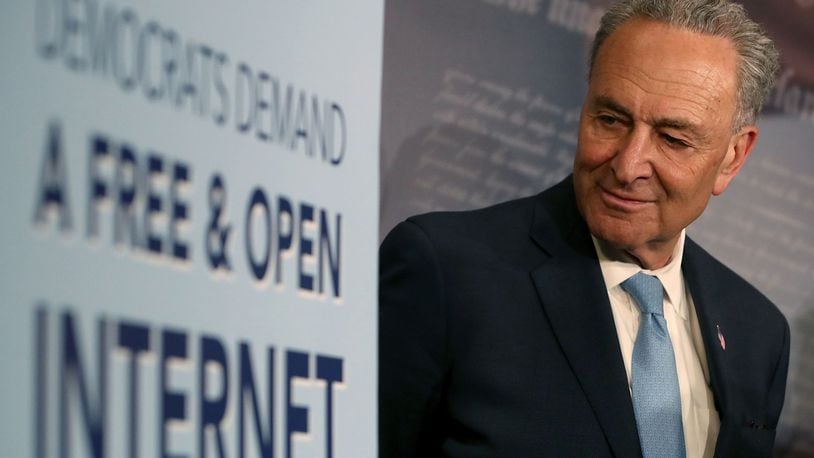Last December, the Trump administration — under new Federal Communications Commission Chair Ajit Pai — reversed those rules, arguing they were never necessary in the first place.
“The Internet wasn’t broken in 2015,” Pai said. “We weren’t living in a digital dystopia.”
Now, the fight has moved to Congress, with the Senate earlier this month voting to block the Trump reversal and return to the 2015 rules. But the legislations appears stalled in the House, where Republicans have a far bigger majority.
“This is Trump’s FCC,” said Rep. Tim Ryan, D-Niles. “Nobody in the House wants to cross the president on any issue, so I think it’s an issue that we’re going to have to take care of if we get the House back next year.”
Advocates for returning to the regulations fear that without them internet service providers will feel free to give preferential treatment to some parts of the internet over others. Among their concerns: That providers will put data from their companies in fast lanes while throttling data and content from competitors. Some fear providers could charge extra to customers to access certain sites, or stifle data from competing companies.
“If you’re paying for an internet connection, you’re not paying for part of the internet,” said Scott Haber, a spokesman for the Internet Association, which opposes the rollback of the 2015 rules. “You’re paying for access all across the internet with the same speed.”
Patrick Losinski, CEO of the Columbus Metropolitan Library, fears rolling back the regulations will hurt some of the 1.7 million patrons who reserved computers in the library system last year. People use the computers to search for jobs, work on school projects and update their resumes, he said, adding, “All of us experience frustration when the internet is slow.”
Ryan predicts the impact will be “like the frog in the boiling water.”
“You’re not probably going to see anything immediately, but over time the average person, the small business, the start up, the entrepreneur is going to get crowded out of access to the internet,” he said. “The big companies are going to be able to start making money and charging for more access.”
Others say the panic is overblown.
Nicol Turner-Lee, a fellow at the Brookings Institution, a moderate think tank, said the free market would not permit internet service providers to block content.
“The internet is not going to break as a result of this,” she said.
A deeper concern, she said, is the wide reach of the FCC and what she says are 1930s-era regulations more suited to the governing of telegraphs and rotary phones than the transmission of data, videos and photos.
“It’s a different medium,” she said, adding that it’s Congress’s responsibility to craft laws on internet usage.
Congress seems in no hurry to do so. The Senate bill called for the rollback to go into effect June 11, but the House would have to follow suit and President Trump would have to sign the bill for that to happen. Let’s just say that’s highly unlikely.
While lawmakers such as Ryan and Rep. Marcy Kaptur, D-Toledo, have signed onto a petition that would force the House to vote on the measure that passed the Senate, others prefer that Congress pass a new bill to address the issue.
Rep. Steve Stivers, R–Upper Arlington, said he’s concerned that each new presidential administration will ping-pong back and forth between new and conflicting regulations about the internet, leaving consumers with little certainty.
The bill he co-sponsored would protect consumers from blocking and throttling, but would not outlaw the concept of paid prioritization, which allows companies to give quicker access to content that consumers are willing to pay for.
Sen. Rob Portman, similarly, supports the concept of changing the law altogether, rather than handling net neutrality through the regulatory process. He voted against the undoing the Trump’s 2017 decision, saying the Obama administration should never have tried to address the issue without Congress.
“I think we ought to have a legislative solution that takes many of the same principles — blocking, throttling, pay prioritization — and puts it into legislation,” the Ohio Republican said.
Sen. Sherrod Brown, D-Ohio, sees the delays as unnecessary. Brown, who voted to return to the 2015 rules, argues the House should follow the Senate’s lead.
“That’s how we started it,” he said. “We’ve already done that in the Senate and we should move on it.”
The Issue
Whether 2015 rules that limited the power of internet service providers such as Comcast and Verizon should be reinstated. The Trump administration last year revoked the rules. With no rules in place, some worry providers will give preferential treatment to some parts of the internet over others, block competitors in favor of their own companies and charge customers extra for faster transmission times.
Two views
“The internet is not going to break as a result of this.”
Nicol Turner-Lee, Brookings Institution fellow.
“Over time the average person, the small business, the start up, the entrepreneur is going to get crowded out of access to the internet.”
U.S. Rep. Tim Ryan, D-Niles.
About the Author
